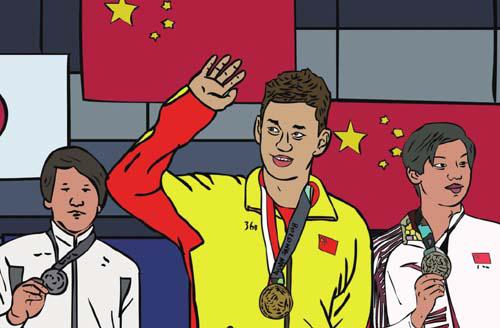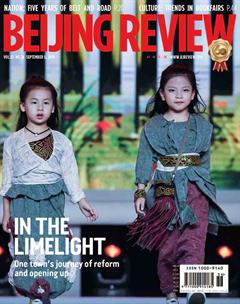Who Should Win Out:Team Sponsors or Personal Sponsors?
2018-09-20

At the 1992 Barcelona Olympics, NBA legend Michael Jordan draped himself in the U.S. fl ag to obscure the teams official sponsor, Reebok, because he was endorsed by its rival, Nike. Recently, a similar scene took place at the 2018 Asian Games in Jakarta, Indonesia.
Sun Yang, Chinas fl amboyant champion swimmer, had to choose between Anta, the Chinese delegations official sponsor, and his own sponsor 361°. After winning the Mens 800M Freestyle race, Sun chose his personal sponsor and came out for the medal ceremony in the bright yellow colors of the brand.
Later in the evening, during the ceremony for the Mens 4x200M Freestyle Relay, in which China finished second, Sun wore the offi cial uniform but covered up his white jersey with the Chinese flag. Chinese sportswear giant Anta issued a statement, saying it had created an awardwinning outfit for the Chinese delegation that represented the spiritual force of Chinese athletes and that according to the contract, they must “wear the official award-winning uniforms when they step onto the podium.” The statement then condemned Suns decision to promote the 361° brand—one of Antas main competitors—as placing personal interests above national interests.
The controversy surrounding Suns choice in sportswear has since become a hot topic in China. Some accuse him of lacking respect for rules and discipline, while others believe there is still a lack of clear guidance on how to deal with these situations.
Clear rules needed
Zhao Hei (The Beijing News): Looking back at all of the events, we cant blame Sun for his lack of contractual spirit. There is a contract between Suns delegation and Anta, but Sun also has a contract with 361°. Therefore, while Anta complains about Sun, 361° is pleased with his behavior.
The biggest headache surrounding this issue is how to explicitly stipulate when a sports star attached to a certain organization must wear the outfit offered by that organizations sponsor. I personally dont agree with Suns behavior after the Mens 800M Freestyle competition. Although Anta may not have signed an agreement with every member of the Chinese swimming team, it expects the team to compel athletes to wear its uniform through administrative means. Suns team should know clearly that wearing award-winning outfits provided by the teams sponsor is a rule. This should be an understood agreement. Since no member of the Chinese delegation asked questions about what to wear, this should be seen as tacit consent.
Recently, there have been conflicts between athletes personal sponsors and team sponsors, and there will be more in the future. How to tackle this issue through market rules is a big question mark for all sides involved.
Ran Yu (theory.gmw.cn): Suns awardwinning track suit controversy has set the media ablaze since it happened. Despite varying opinions, at least some consensus has been reached: It was an actual violation. The debate now is on whether he should be accused of “placing personal interests over national interests” as Anta claimed, and if it is an example of violating rules since the award-winning outfit represents the identity and image of the country. Objectively speaking, the detractors rhetoric has gone a little too far and off topic, since this is in essence a very simple matter.
Respect for the spirit of a contract and for sponsors is an important prerequisite for competitive sports in seeking marketization. Contract-based or practice-based, Anta enjoys the exclusive sponsorship of the Chinese delegation at the Asian Games. Therefore, it is natural that Anta wants to safeguard its legitimate rights. However, the rhetoric should be dealt with in a more rational manner, since it is, strictly speaking, just a commercial matter.
One thing to make clear is that this controversy indicates a violation committed not directly by Sun, but a violation of agreement between Team China and Anta. There are doubts as to whether these agreements are oral or written agreements, laid out as regulations or carried out as part of traditional practices. For a long time, the commercial development of the Chinese Olympic Committee, the International Olympic Committee and individual athletes have repeatedly contradicted each other. Everything can be boiled down to bad management and a lack of professionalism within the sports system.??
An obvious problem is that national teams or event delegations often have a group sponsorship contract, but they cannot effectively ensure the star athletes on the team will comply with the commercial contract signed by the team. Athletes therefore repeatedly challenge the contracted team endorsements, which results in losses for both sides: The commercial value of star athletes is frequently questioned and the market-oriented reform of related projects faces greater barriers.
Against such a backdrop of deepening reform and marketization in competitive sports, there are still many ambiguities as to commercial terms and specifi c rules.

In most cases, people only see the sweet smiles on stage but not the bitter entanglements behind the scenes. Hopefully, this controversy will serve as a turning point toward more standardized regulations in the commercial activities of sports teams and a more transparent mechanism of interest distribution.
National interests first
Dong Xiaomai (sports.qq.com): After Sun received criticism for wearing a 361° outfi t on the podium, he should have reflected on his behavior and tried to correct it. However, it seemed to be a premeditated ploy to cover up his delegations uniform with the Chinese fl ag to conceal the Anta logo during a later podium visit.
The Chinese delegation competed at the Asian Games on behalf of China, but some members turned a blind eye to basic rules, including credibility. Sun, who has won several gold medals at the Asian Games, behaved as he pleased because of his outstanding performance. His achievements are the most important bargaining chip with his team, the delegation and even the General Administration of Sport of China. In the face of such a powerful sports star, even the authorities have to bend.
To wear the same award-winning uniforms is a basic code of conduct for groups such as sports teams that compete for a country on the international stage. In World Cup football matches or Olympic basketball matches, individual athletes are allowed to choose shoes that represent their personal sponsors, but in terms of track suits, they must wear the team outfit. These uniforms are usually provided by offi cial sponsors. As for the Chinese sports delegation, there is an agreement of sponsorship between Anta and the Chinese Olympic Committee, which demands adherence.
As for the side whose legitimate rights were breached, Anta has the right to turn to the Chinese delegation for protection and ask for commitment to the spirit of the contract. It seems that as long as Sun keeps winning medals for the country, he will always be a hero. For so many years, whether the Olympics, Asian Games or almost any other sports competition, the most important thing has been to win medals. An athletes sense of discipline or rules doesnt seem as important when compared to medals.
Ma Yuecheng (baijiahao.baidu.com): Whatever reason there is, standing atop a podium on behalf of China but not wearing a Team China offi cially-sponsored uniform is a severe violation of norms and regulations. It sends a worrisome message.
Why was he the only one out of all the Chinese athletes at the Asian Games who wore 361° outfi ts? It was a clear trampling of the rules and a bad precedent where money triumphs over everything and it should not be allowed to spread any further.
Sun is certainly not the only one with a sponsor from the Chinese delegation or in the world, but there is hardly anyone who could parallel him with such an act in complete violation of rules, now or in the past. The dress code on such an important occasion can never give way to athletespersonal preferences or habits picked up during regular training.
